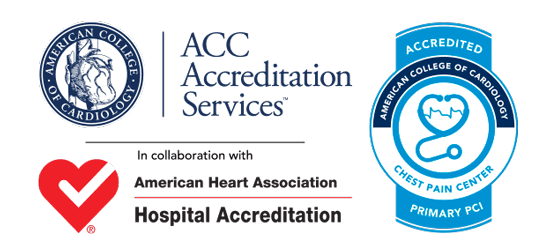What You Should Know: Recognize and React to Cardiac Emergency
Cardiac arrest or heart attack can happen anywhere at any time. When a cardiac emergency does happen, every minute counts.
Heart attacks are the leading cause of death in the United States, with over 600,000 people dying annually of heart disease, according to the Centers for Disease Control and Prevention. More than five million Americans visit hospitals each year with chest pain. As an accredited Chest Pain Center, Northern Nevada Medical Center is recognized for its ability to assess, diagnose and treat patients who may be experiencing a heart attack.
The American Heart Association urges everyone to help improve the national cardiac arrest survival rate by taking quick action when faced with a cardiac arrest emergency. Know the warning signs of a possible heart attack and cardiac arrest so that you can recognize a medical emergency:
- Uncomfortable pain, pressure, fullness or squeezing in the chest
- Pain or discomfort in the shoulders, neck, arms or jaw
- Lightheadedness, fainting, sweating, nausea or shortness of breath
- Unusual stomach or abdominal pain
- Nausea or dizziness
- Shortness of breath and difficulty breathing
- Unexplained anxiety, weakness or fatigue
- Palpitations, cold sweat or paleness
Reacting to Cardiac Emergency
Call 9-1-1 immediately if you see someone with signs of a possible heart attack or cardiac arrest. Do not wait to seek medical attention. Not all of the warning signs occur in every attack, and the signs will sometimes disappear and return.
Cardiac arrest is the number one threat to the overall health and lives of Americans, with approximately 700 deaths from cardiac arrest every day. Because cardiac arrest often occurs in the home, knowing CPR may help you save the life of a loved one.
The signs of a cardiac arrest in a person are different from those of a heart attack. A person in cardiac arrest may:
- Collapse and lose consciousness
- Stop normal breathing
- Lose pulse and blood pressure
CPR can help keep a victim of cardiac arrest alive until emergency help arrives. CPR is important because it helps maintain the vital blood flow to the heart and brain until defibrillation — an electric shock that can restore a heart beat — or other lifesaving measures can be administered.
Coronary artery disease is one of the primary causes of cardiac arrest. Other causes include electrocution, drowning, respiratory arrest, choking or trauma. When a person goes into cardiac arrest, the heart's electrical impulses become chaotic. This irregular heart rhythm, called ventricular fibrillation, causes the heart to stop pumping blood. It may be reversed with cardiac defibrillation.
Automated external defibrillators, or AEDs, are electronic devices that deliver an electric shock to the heart to restore its natural rhythm. Early defibrillation is the critical link in the cardiac arrest chain of survival and can successfully correct ventricular fibrillation.
Chest Pain Center
The Chest Pain Center of Northern Nevada Medical Center offers advanced testing and treatment for chest pain, dysrhythmias and other heart emergencies, 24 hours a day, seven days a week. A team of highly-skilled cardiology professionals perform a number of services, ranging from noninvasive to interventional cardiology.
Depending on the type and severity of the heart attack, the cardiac team may admit patients to the Chest Pain Center at the hospital to administer treatments to clear blocked arteries and restore blood and oxygen flow to damaged heart tissue. All patients are rapidly evaluated and a course of treatment is begun.
Learn more about the Heart and Vascular Center at Northern Nevada Medical Center.

